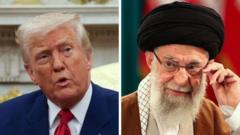The US-Ukraine minerals agreement establishes a joint investment fund aimed at extracting valuable resources, reflecting a newfound partnership amidst ongoing conflict and mutual geopolitical interests.**
US and Ukraine Finalize Landmark Minerals Agreement Amid Geopolitical Tensions**

US and Ukraine Finalize Landmark Minerals Agreement Amid Geopolitical Tensions**
The recent minerals deal between the US and Ukraine marks a significant step in strengthening economic ties while countering Russian influence.**
Washington and Kyiv have officially signed a pivotal deal concerning Ukraine's extensive natural resources, concluding months of intricate negotiations. Though many specifics remain undisclosed, both governments have confirmed the establishment of an investment fund intended for mineral extraction and a clear revenue-sharing blueprint.
The US has stated that the agreement aims to demonstrate its commitment to a "free, sovereign, and prosperous" Ukraine, serving as a counterweight against Russian ambitions. This deal follows a previous contentious meeting between US President Donald Trump and Ukrainian President Volodymyr Zelensky, which had raised concerns about American support for Ukraine.
Economic Minister Yulia Svyrydenko's visit to Washington culminated in a successful signing ceremony with US Treasury Secretary Scott Bessent. Svyrydenko outlined the agreement on social media, emphasizing that it creates a reconstruction investment fund to draw Western investment into Ukraine's mineral, oil, and gas sectors. According to her, Ukraine retains ownership of the resources, and both nations will share profits equally, with no financial obligations imposed on Ukraine.
As part of this alliance, the US has pledged to assist Kyiv in attracting investment and advanced technology. Additionally, the deal could feature new US aid to Ukraine, which may include advanced defense systems. Significantly, revenues generated from the fund will not incur taxes in either country.
While the agreement awaits ratification by Ukrainian lawmakers, its implications for global security and energy independence are noteworthy. Nonetheless, questions remain about its connection to US security guarantees—an area Zelensky has actively pursued.
Moreover, the US Treasury Department has assured that parties involved in financing Russia's war efforts will not benefit from the reconstruction process in Ukraine. Trump framed the deal as a form of compensation for US expenditures on the ongoing conflict, referencing a substantial financial commitment that some estimates suggest does not fully align with the actual figures provided by independent analysis.
Ukraine houses approximately 5% of the world's critical raw materials, including substantial reserves of graphite, titanium, and lithium—minerals essential for modern technology and weaponry. However, some of these resources remain under Russian control, complicating the situation. Moreover, concerns regarding unexploded mines in war-affected areas hinder immediate extraction efforts.
As for Russia's reaction, it has yet to respond officially to the deal; however, earlier statements from President Putin express confidence in Russia's resource capabilities compared to Ukraine's.
This agreement not only demonstrates Ukraine's potential in global markets but also signals a renewed commitment to the nation’s economic recovery following the ravages of war.






















